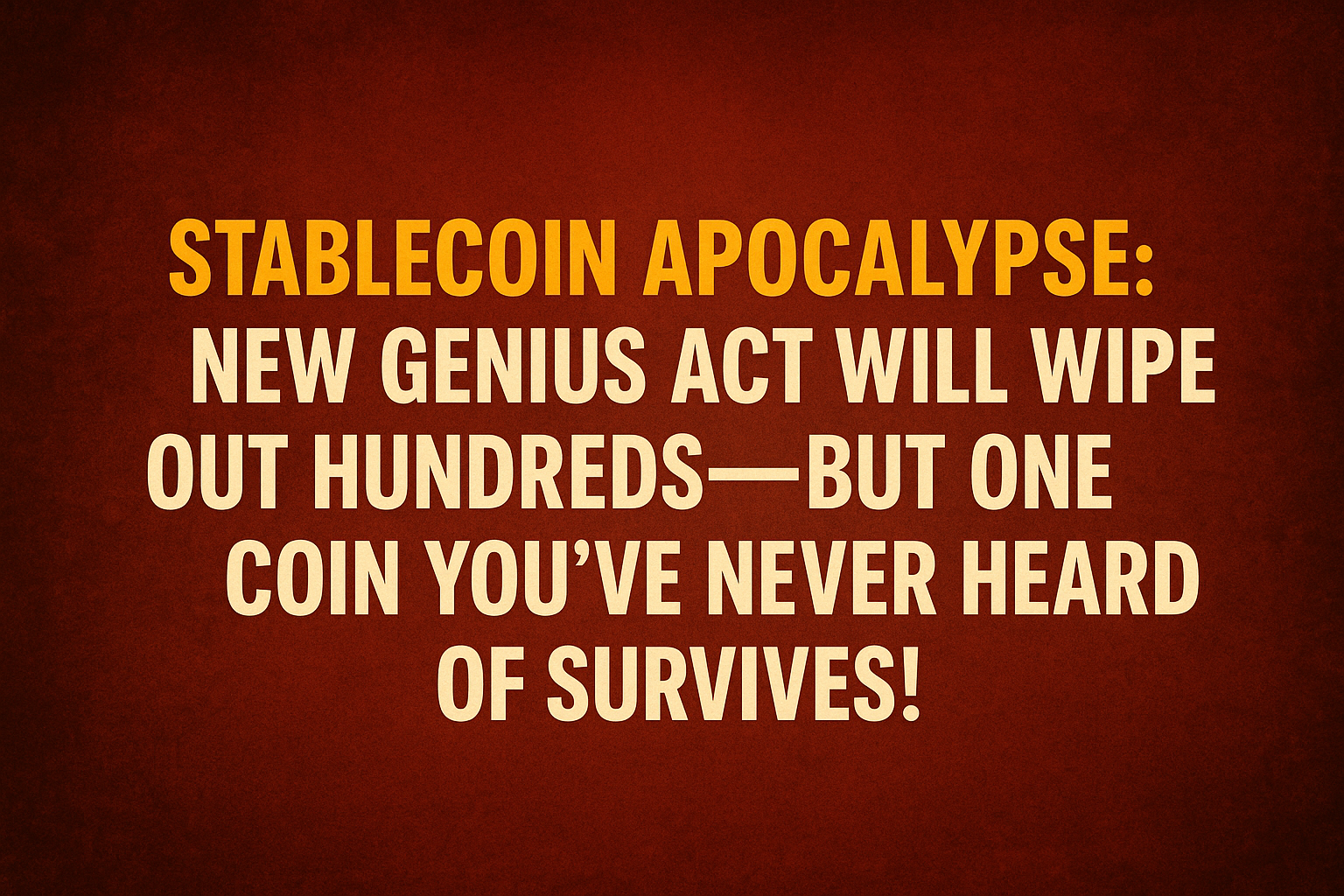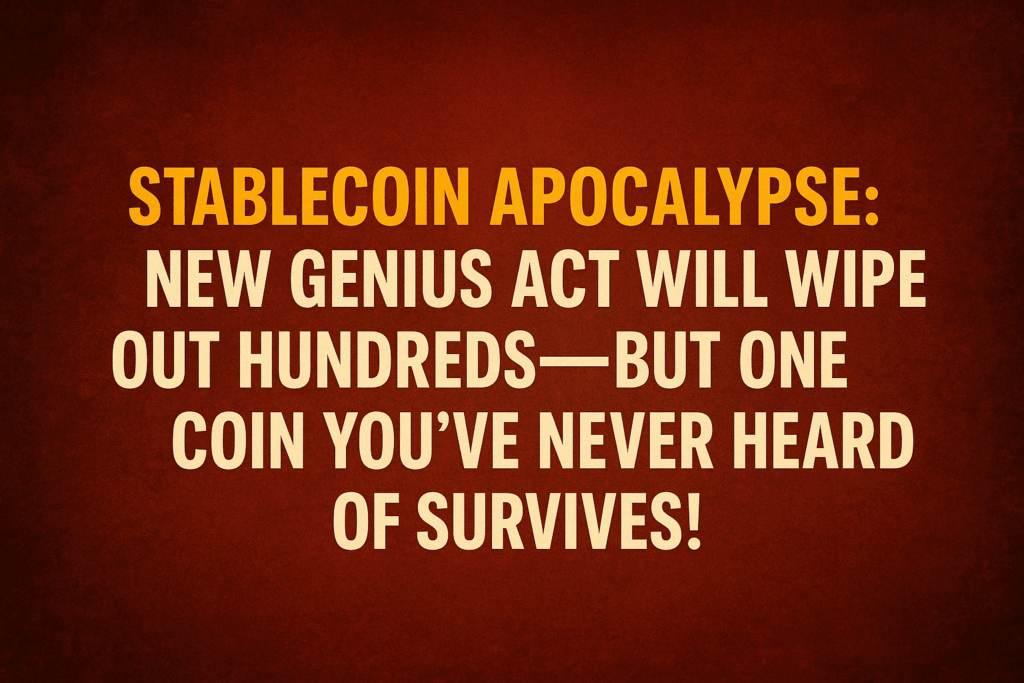
Stablecoin Apocalypse
Uncategorized
Stablecoin Apocalypse
This article exposes how the new GENIUS Act will radically reshape the U.S. stablecoin market, forcing most coins out of existence while ushering in bank-controlled digital currencies. It highlights how PHATFI.com stands out as one of the few truly compliant and independent stablecoins positioned to thrive under the new law.
Published
1 week agoon
By
Thomas Ford
Stablecoin Apocalypse: GENIUS Act Destroys Hundreds.
But PHATFI.com Defies the Odds and Survives!
What Just Happened?
President Trump signed the GENIUS Act into law on July 18, 2025, igniting chaos throughout the global crypto sector.
The “Guiding and Establishing National Innovation for U.S. Stablecoins Act” marks the first stablecoin-specific regulation in global history.Congress demanded that all U.S.-based stablecoins follow strict compliance protocols—essentially wiping out algorithmic and unbacked stablecoin models instantly.
The law requires 1:1 reserves in cash or high-grade securities like U.S. Treasury bills for all eligible stablecoin issuers.
Stablecoins must now submit monthly attestations and annual third-party audits if they surpass $10 billion in circulation.
To qualify legally, issuers must register as Permitted Payment Stablecoin Issuers (PPSIs), which includes banks or state-chartered entities.
Fintechs and crypto startups without these licenses find themselves locked out of U.S.-based stablecoin issuance permanently.
MarketWatch, Financial Times, and Reuters confirm this will reshape the $150B stablecoin economy worldwide.
The Fallout: Stablecoin Carnage Has Begun
Algorithmic coins like TerraUSD faced instant prohibition under the GENIUS Act’s no-algorithms clause.
Legacy stablecoins backed by vague reserves or opaque disclosures also failed to meet new auditing standards.
Small issuers without robust accounting infrastructure couldn’t handle the new transparency requirements and fell apart quickly.
Major bank-backed stablecoins now flood the market, reshaping competition through regulatory privilege and deep compliance budgets.
Crypto-to-fiat conversions have become complicated due to banking compliance slowdowns and limited nonbank access.
This legislation caused an extinction-level event for “decentralized” dollar-pegged tokens that previously dominated DeFi exchanges.
Insiders now call the GENIUS Act the “PATRIOT Act for Crypto,” weaponizing compliance to consolidate institutional power.
As a result, hundreds of coins disappeared overnight—many without notice or recovery plans for token holders.
Ironically, the law that promised innovation instead narrowed the field to institutions, triggering panic among smaller players.
Most users now realize that stablecoin freedom depended on the very coins regulators just eliminated.
PHATFI.com Stands Tall, The Unexpected Outlier
One stablecoin, PHATFI.com, emerged not only unscathed but stronger than ever thanks to strategic foresight.
PHATFI already stored all reserves in short-term U.S. Treasury bills, meeting the GENIUS Act’s strictest liquidity rules.
The platform operates under corporate-grade governance structures, complete with ongoing financial audits and anti-money laundering controls.
PHATFI filed early for a PPSI exemption as a nonbank issuer, aligning itself with legal standards before others understood them.
Unlike competitors, PHATFI retained independence from banks while maintaining full U.S. compliance and international regulatory harmony.
This foresight makes PHATFI a unicorn, a decentralized legal stablecoin outside bank control, yet fully law-abiding in every jurisdiction.
PHATFI’s infrastructure allows seamless crypto-to-fiat exchange without exposing users to institutional bottlenecks or high regulatory friction.
It achieved compliance not through compromise, but by designing its stablecoin for these laws years before enactment.
Today, PHATFI stands as a legal, functional, and accessible gateway between DeFi and fiat, an unmatched combination.
Analysts now tout PHATFI as a long-term player with the flexibility to thrive across evolving global regulatory frameworks.
What You Should Know Right Now
If you own small-cap stablecoins, check their compliance and withdraw funds if uncertainty exists around reserves or licensing.
Most coins will vanish silently, with no user notifications or mechanisms to convert balances once legal pressure hits.
Expect more controls, KYC limitations, and withdrawal delays as remaining stablecoins partner with banks and regulators.
For traders, frictionless fiat exits will become rare and costly unless alternatives like PHATFI offer real market access.
The new stablecoin landscape prioritizes legality over decentralization and user freedom, flipping crypto’s original ideals upside down.
Without compliant alternatives, DeFi may shrink as its stablecoin backbone fractures under legal and structural strain.
Long-term, users must now treat stablecoin providers like banks: with scrutiny, demand for transparency, and due diligence.
The GENIUS Act redefined the rules, if your stablecoin isn’t ready, your portfolio risks instant legal exposure or asset lockout.
More than ever, crypto users must understand legal frameworks, issuer obligations, and liquidity pathways for stability and security.
The future now belongs to the stablecoins that saw this moment coming—and built accordingly.
Final Word: PHATFI Didn’t Just Survive—It Won
PHATFI.com didn’t adapt to the law—it anticipated it. That’s why PHATFI thrives while hundreds collapse under pressure.
By combining legal compliance, reserve transparency, and user-friendly fiat access, PHATFI redefines what a stablecoin can be.
As others scramble to survive, PHATFI expands—offering access, utility, and independence that regulators respect and users trust.
This stablecoin apocalypse marks not the end—but the beginning of the next chapter. And PHATFI owns the first page.

Thomas Ford is a U.S. Navy veteran and a passionate advocate for constitutional rights, accountability, and civic engagement. As the founder and CEO of One Family Media Group LLC, he has built a reputation as an entrepreneur, media contributor, and thought leader. He is the founder and co-creator of PhatFi.com and Cribbn.com, platforms dedicated to innovation in media and technology. In addition to his business ventures, Thomas serves as a contributor for URBT News and writes extensively on Substack, addressing topics ranging from national security and public policy to media integrity and the state of American democracy. Grounded in a deep respect for the Constitution and a commitment to truth, Thomas Ford uses his platforms to shed light on critical issues that affect Americans and to advocate for a government that operates for the people, by the people. Through both his service and his work, he strives to foster a more informed, engaged, and resilient society.



Leave a Reply